#decolonize stem
Text
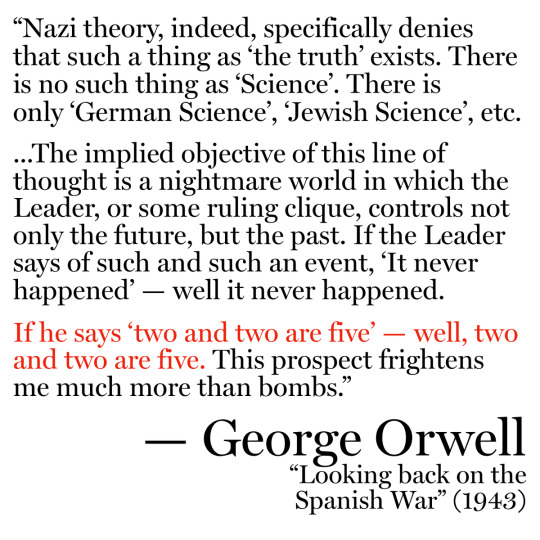
I know it is the fashion to say that most of recorded history is lies anyway. I am willing to believe that history is for the most part inaccurate and biased, but what is peculiar to our own age is the abandonment of the idea that history could be truthfully written. In the past people deliberately lied, or they unconsciously coloured what they wrote, or they struggled after the truth, well knowing that they must make many mistakes; but in each case they believed that ‘the facts’ existed and were more or less discoverable. And in practice there was always a considerable body of fact which would have been agreed to by almost everyone. If you look up the history of the last war in, for instance, the Encyclopaedia Britannica, you will find that a respectable amount of the material is drawn from German sources. A British and a German historian would disagree deeply on many things, even on fundamentals, but there would still be that body of, as it were, neutral fact on which neither would seriously challenge the other. It is just this common basis of agreement, with its implication that human beings are all one species of animal, that totalitarianism destroys. Nazi theory indeed specifically denies that such a thing as ‘the truth’ exists. There is, for instance, no such thing as ‘science’. There is only ‘German science’, ‘Jewish science’ etc. The implied objective of this line of thought is a nightmare world in which the Leader, or some ruling clique, controls not only the future but the past. If the Leader says of such and such an event, ‘It never happened’ – well, it never happened. If he says that two and two are five – well, two and two are five. This prospect frightens me much more than bombs – and after our experiences of the last few years that is not a frivolous statement.
But is it perhaps childish or morbid to terrify oneself with visions of a totalitarian future? Before writing off the totalitarian world as a nightmare that can’t come true, just remember that in 1925 the world of today would have seemed a nightmare that couldn’t come true. Against that shifting phantasmagoric world in which black may be white tomorrow and yesterday’s weather can be changed by decree, there are in reality only two safeguards. One is that however much you deny the truth, the truth goes on existing, as it were, behind your back, and you consequently can’t violate it in ways that impair military efficiency. The other is that so long as some parts of the earth remain unconquered, the liberal tradition can be kept alive.
-- George Orwell, "Looking Back on the Spanish War" (1943)
Eerie.
[ Note: In 1949, Orwell subsequently wrote Nineteen Eighty-Four. ]
--
"One of the key contributions of critical theorists concerns the production of knowledge. Given that the transmission of knowledge is an integral activity in schools, critical scholars in the field of education have been especially concerned with how knowledge is produced. These scholars argue that a key element of social injustice involves the claim that particular knowledge is objective, neutral, and universal. An approach based on critical theory calls into question the idea that objectivity is desirable or even possible. The term used to describe this way of thinking about knowledge is that knowledge is socially constructed. When we refer to knowledge as socially constructed we mean that knowledge is reflective of the values and interests of those who produce it."
-- Ozlem Sensoy/Robin DiAngelo, "Is Everyone Really Equal?"

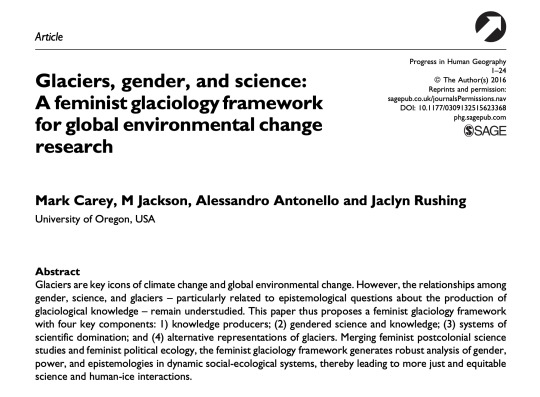
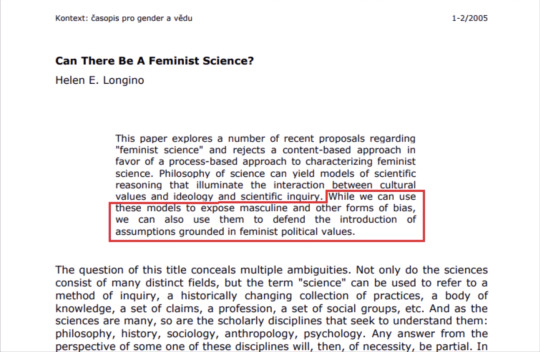


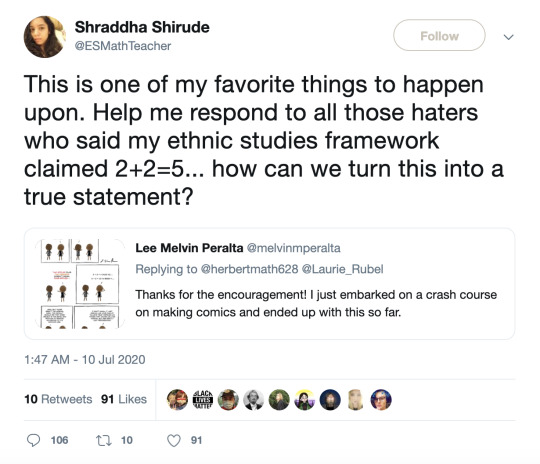

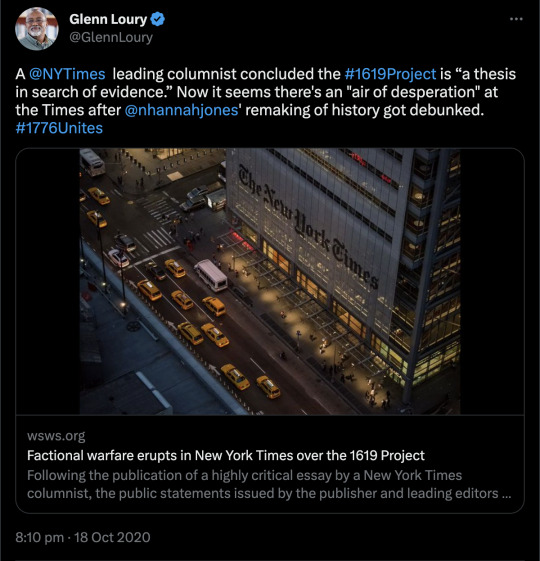
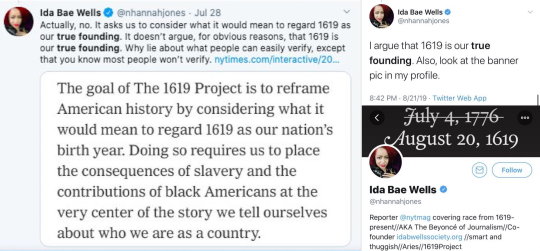
#George Orwell#Looking Back on the Spanish War#1619 Project#historical revisionism#revisionist history#2+2=5#woke math#postmodernism#decolonize science#cultural relativism#decolonize STEM#woke#wokeism#cult of woke#wokeness as religion#wokeness#religion is a mental illness
39 notes
·
View notes
Text
Everyone asks what I read and truth be told I learned a lot of politics through experience and listening to Black revolutionaries.
There is nothing- nothing- that I say on my blog that Malcom X or James Baldwin or Frantz Fanon or Thomas Sankara or Frederick Douglass didn't say first (and much more eloquently)
Further, their words have given me the tools to think critically about not just my place, but everyone else's and what we owe each other.
I myself, wouldn't have a Lot of the politics I do had I not been exposed to the ideas they talked about with such knowledge and experience. Whether it was by following activists or looking up things up or learning about them myself, they're influential and I would even say foundational to decolonization and dismantling white supremacy.
My usual recs are Wretched of the Earth and Braiding Sweetgrass, but those are just starters since people just usually ask where to begin.
So I wanted to make this post and for them to be Very Much credited for the following I have and my politics since I don't often mention them.
For example, I talk a lot about how the comfort of the privileged is an obstacle that stems directly from their privilege. How libs who only conditionally support peaceful protests don't understand what's necessary; that challenging the status quo can't be done comfortably and it's never been "peaceful" for the oppressing classes. How it's detrimental to progress to compromise on how we fight for our rights and to have been liberals telling us we demand too much.
Frederick Douglass:
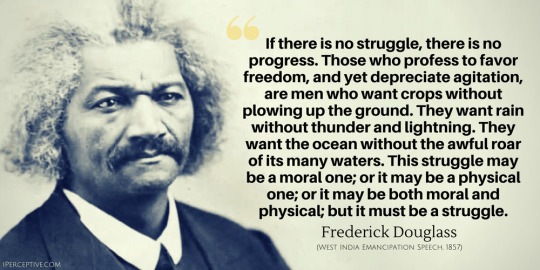
Frantz Fanon:
Privileges multiply and corruption triumphs…Today the vultures are too numerous and too voracious in proportion to the lean spoils of the national wealth. The party, a true instrument of power in the hands of the bourgeoisie, reinforces the machine, and ensures that the people are hemmed in and immobilised.
Thomas Sankara:
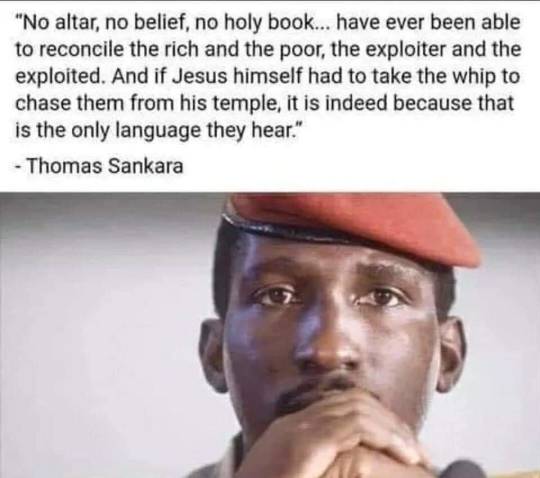
Malcom X:
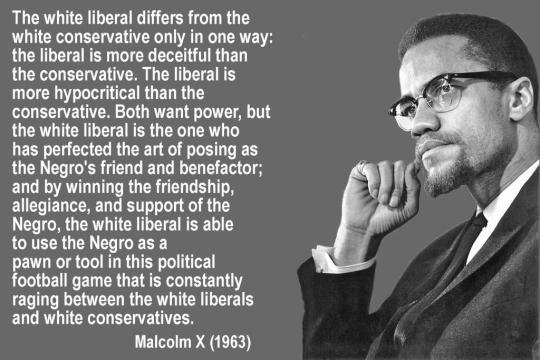
James Baldwin:
In a way, I owe the invitation to the incredible, abysmal, and really cowardly obtuseness of white liberals. Whether in private debate or in public, any attempt I made to explain how the Black Muslim movement came about, and how it has achieved such force, was met with a blankness that revealed the little connection that the liberals' attitudes have with their perceptions or their lives, or even their knowledge—revealed, in fact, that they could deal with the Negro as a symbol or a victim but had no sense of him as a man.
Bonus MLK Jr quote:
Over the last few years many Negroes have felt that their most troublesome adversary was not the obvious bigot of the Ku Klux Klan or the John Birch Society, but the white liberal who is more devoted to “order” than to justice, who prefers tranquillity to equality. In a sense the white liberal has been victimized with some of the same ambivalence that has been a constant part of our national heritage. Even in areas where liberals have great influence— labor unions, schools, churches and politics—the situation of the Negro is not much better than in areas where they are not dominant. This is why many liberals have fallen into the trap of seeing integration in merely aesthetic terms, where a token number of Negroes adds color to a white-dominated power structure."
Whether your medium is a PDF, a book, movie, clips, quotes, podcast, whatever. However you digest info easiest: learn about them and their words. Think about them. Talk about it and process it with friends.
That's how you shape your politics to be similar to the ones you find on my blog.
#malcolm x#mlk jr#thomas sankara#Frederick Douglass#frantz fanon#james baldwin#politics#human rights#justice#protests#theory#colonialism#imperialism#racism#privilege#whiteness#white supremacy#capitalism#usa#liberal#liberalism#white liberals#allies#solidarity#intersectionality
680 notes
·
View notes
Text
Less than 10 faculty members at my university have signed our SJP's letter calling for a ceasefire and most of them are in STEM and tbh I never want to see some whiny liberal arts/social sciences prof do a land acknowledgment or talk about "decolonization" ever again or I will break their shins
785 notes
·
View notes
Note
"Both indigenous and colonizers" CAN PEOPLE STOP TALKING ABOUT SHIT THEY DON'T UNDERSTAND PLEASE
This wave of antisemitism and bullshit about "indigenous vs colonizer" makes me so scared as an indigenous person in the US of what will happen when Land Back movements do result in actual sovereignty restoration and then tribes do what people do and disagree over land and resources, like we were doing for thousands of years before Europeans arrived. Will we be reduced down to colonizers too??
It feels like Westerners, especially USAmericans, have such a black and white idea of what it means to be indigenous and what it means to be a colonizer/settler (because those terms are always conflated) and it makes me so angry and frustrated to see people apply those standards and lines thinking not just to complex sovereignty movements in their own countries but also to incredibly complex conflicts and wars happening on the other side of the world.
The damage I've seen done to sovereignty movements here in the US alone, people going around claiming that we want all "settlers" to go back to Europe or that we're going to start massacring people, has been horrible and the fact that it's all just to justify antisemitism makes me sick.
Genuinely. They're blocked now, but that same person said something to the effect of "Would an Iranian praying in a Mosque built on the ashes of a former synagogue be decolonization?"
And that was the point at which I was like. Ok. It seems like most people genuinely don't actually know what the terms "colonization", "colonizer" and "coloniality" mean. Obviously, that wouldn't be decolonization, because the Jews never colonized Iran. Emigration and colonization aren't the same fucking thing!
I used to have so much faith in my generation. I thought we were critical thinkers, capable of flexibility and engagement with new ideas. But I'm realizing now that we're basically just rebranded boomers. Back in the day, anybody you disagreed with was labelled as a "Communist". It didn't actually fucking matter if they were communist sympathizers, Soviet sympathizers, or even if they were remotely allied with socialist ideals. You could just call them a "Communist" and be done with it, without even understanding what that term means.
It's the same shit today. Instead of a HUAC witch hunt targeting communists, it's a social witch hunt targeting "colonizers" and "Zionists". I am terrified that the moment indigenous rights movements in the Americas and Oceania start making practical strides in Land Back, regaining rightful control over the ways your own land is used, you'll all be labelled as "colonizers" or "imperialists" or whatever the bad buzz word of the month turns out to be.
People simply can't wrap their heads around the idea that indigenous decolonization doesn't have the end goal of ethnically cleansing non-native people from the Americas. And it's because they're so absorbed in colonial thinking. They can't even fucking imagine what sovereignty could look like beyond an authoritarian structure based on control and violence. It's the same with Israel and Palestine-- they think that Jewish sovereignty must look like complete Jewish control to the detriment of Arabs, and they think Palestinian sovereignty must look like total Arab control to the detriment of Jews. The idea that a shared state or a two-state solution is "racist" stems from that false dichotomy.
Establishing an ideological binary of violence that pits "indigenous" against "colonizer", "native" against "settler", and "us" against "them" with no room for cooperation or collaboration is the core of colonialism. Because the core of colonialism is the idea that only one group can have true power at a time. And that's just not the way the world has to work.
269 notes
·
View notes
Text
Things read in May
Essays & Articles:
Ursula K. Le Guin on Being A Man
Investigating parents of transgender youth has agency on ‘brink of collapse,’ staff warns
Five Indigenous Speculative Fiction Authors You Should Be Reading
DECOLONIZING SCIENCE FICTION AND IMAGINING FUTURES: AN INDIGENOUS FUTURISMS ROUNDTABLE
Using Dogs As A Tool of Racial Oppression
Rings of Power: The new hobbits are filthy, hungry simpletons with stage-Irish accents. That’s $1bn well spent
First case of HIV cure in a woman after stem cell transplantation reported at CROI-2022
The Trees That Miss The Mammoths
NOPE’S SCIENCE CONSULTANT REVEALS THE NAME AND INSPIRATION FOR THE MOVIE’S ALIEN
Reflections on the Poetry of Eavan Boland
The dire state of trans healthcare in Ireland
How Letterkenny Got Indigenous Representation So Right
Einstein's Parable of Quantum Insanity
Surgical amputation of a limb 31,000 years ago in Borneo
Most Transgender Children Stick With Gender Identity 5 Years Later: Study
Were you a ‘parentified child’? What happens when children have to behave like adults
Fear of a Black Hobbit
It’s a ‘Full-Contact’ Haunted House. What Could Go Wrong?
The Craft: How a Teenage Weirdo Based on a Real Person Became an Icon
Remember When Multiplayer Gaming Needed Envelopes and Stamps?
‘We’ll Never Make That Kind of Movie Again’ An oral history of The Emperor’s New Groove, a raucous Disney animated film that almost never happened.
5 Incredible Sagas of Fandom Scams and Deception
I Used to Love British Period Dramas. Now I See Them as Colonial Propaganda
Why gender essentialism is a white supremacist ideology
Liberating Our Homes From the Real Estate–Industrial Complex
You Don’t Have To Be Pretty – On YA Fiction And Beauty As A Priority
Ten Years Later, There’s Still Nothing Like Tarsem Singh’s The Fall
Tolerance is not a moral precept
Scottish Poet and Publisher Derick Thomson 'Transformed' Gaelic Poetry
Poetry:
The Universe, as in One Last Song for the Lonely Hearts by Michelle Hulan
An Ordinary Evening in New Haven by Wallace Stevens
Heaven by George Herbert
Return from Death by Derick Thomson
Coffins by Derick Thomson
Chemin De Fer by Elizabeth Bishop
Yes, It Was The Mountain Echo by William Wordsworth
The Man and the Echo by William Butler Yeats
The Most of It by Robert Frost
Eros Turannos by Edwin Arlington Robinson
Books:
The Dark Yule by R. M. Callahan
The Invasion by K. A. Applegate
The Whisper by Aaron Starmer
House of Leaves by Mark Z. Danielewski
Miss Iceland by Auður Ava Ólafsdóttir
#tcp#this is late bc i just kept forgetting to post it all lol#an open window#articles#essays#poetry
483 notes
·
View notes
Quote
In Palestine, Sephardic, Mizrahi and orthodox Ashkenazi Jews were integral parts of the indigenous population. Native Palestinian Jews shared not only the Arabic language with the Arab Palestinians but also memories, cultural traditions, customs and sense of belonging and relations to the land. From the Palestinian perspective, Jews living in the region were merely another religious community. Having no experience with European nationalism, they could not understand, or accept, the idea that Jews were a national group which claimed exclusive “ownership” over their own country – particularly Jews living in Russia, Poland, Britain and the US. The enmity that has existed for the past 125 years between European Jewish settlers and the Arabs of Palestine does not arise from some historic or religious enmity between the two peoples. Rather, it stems from the colonial practices of Zionism and the resistance to Zionist displacement on the part of the Palestinians.
Jeff Halper, Decolonizing Israel, Liberating Palestine: Zionism, Settler Colonialism, and the Case for One Democratic State
810 notes
·
View notes
Text
by Dan Perry
The serious international media is most comfortable when it can maintain a comfortable distance from any particular protagonist. Generally, this is wise. It's also good business, because the media is struggling to stay afloat financially and doesn't need the headache of political controversy—as Michael Jordan famously said, Republicans buy sneakers, too. And so, it generally gravitates toward a type of bothsidesism that suggests to readers and viewers that there are no good guys on any given field. Usually, that is sufficiently accurate that it works quite well.
It breaks down when the market of news consumers—or other powerful players—has chosen sides. The media has largely presented Russia's President Vladimir Putin as satanic, and Ukraine's Volodymyr Zelensky as impishly heroic. So, coverage of the Ukraine war has been a tad simplistic and has hardly reflected the Russian case. But this is not, on balance, the worst thing in the world: Putin is odious and Russia's attack on Ukraine was, in the final analysis, a mistake and a crime.
No such luck in the case of the Gaza war. The media has largely stuck to its instincts for impartiality: "Both sides" have their narratives, and both have good and bad. One may be a terrorist group and the other a Western-leaning democracy—but in this era of progressive decolonization narratives, an association with the West will not get you very far with much of the Western media. Ironic.
The Israelis indeed have good and bad. But Israel is a democracy that can dump its useless government and probably will. Israel's mainstream wants to be rid of the conflict with the Palestinians and views the issue largely through the prism of security. Israel has ultranationalists, violent settlers, and religious fanatics, but the bulk of the population inhabit the same Euclidean universe, share the same values, and believe in the same primacy of reason as most news consumers abroad.
None of that can be said of Hamas, and since Hamas is omnipotent in Gaza it should be the center of media scrutiny. It is a violent fundamentalist movement that seeks not just the demise of Israel but also, with its jihadi fellow travelers, of the West. Hamas and its accomplices share none of the values that drive the modern world, from respect for human rights to freedom of speech to the rule of law.
Are so many Westerners, especially Gen Zers, too feeble-minded to get this? Perhaps to a degree. But I say that a major factor is that they are not being informed.
Is it antisemitism on the part of the foreign press corps, as some Israeli partisans will rush to charge? Not much, in my experience. It mostly stems from intellectual laziness typical of our era, a surfeit of cynicism typical of journalists, and a dollop of woke-ish fuzziness.
Some argue that no one appointed journalists to connect the dots for people, and that the wisest approach would be to just "report the facts." The self-righteous just-the-facts school misses something basic. Every nanosecond in the universe throws up an infinity of facts. The choices of which tiny minority among them to pursue and how to present them are already judgement calls.
When the result is the normalization of a monstrosity like Hamas, that is malpractice. Have I been guilty of it myself? All I can say is, like Oscar Schindler in the film, I feel I did not do enough.
47 notes
·
View notes
Text
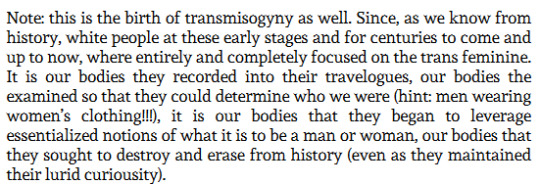
- b. binaohan, decolonizing trans/gender
modern transphobia is completely rooted in transmisogyny. the heterosexist gender binary is a creation of the colonial settler state, and that structure was specifically formed to violently eliminate indigenous transfeminine people. any conversation on transphobia needs to recognize how its history directly stems from this transmisogynist rhetoric.
143 notes
·
View notes
Text
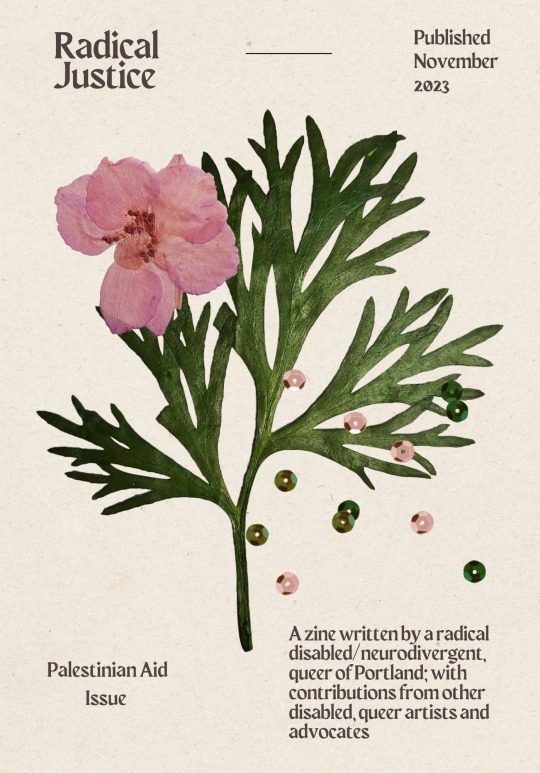
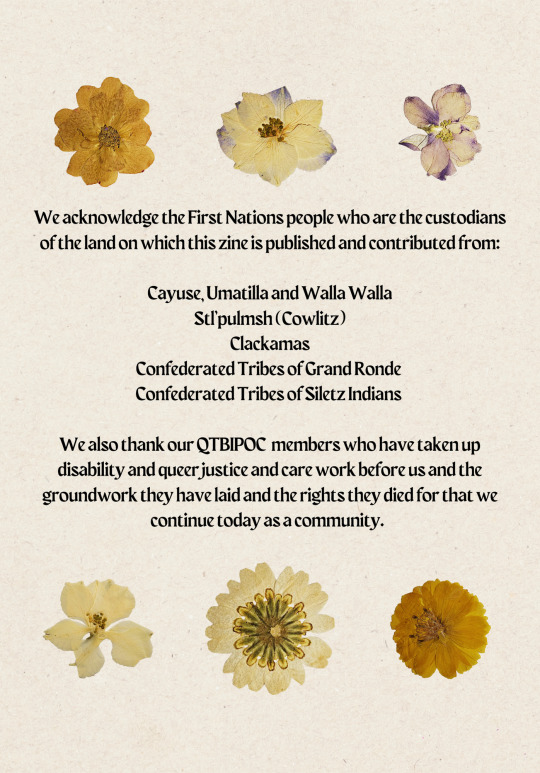
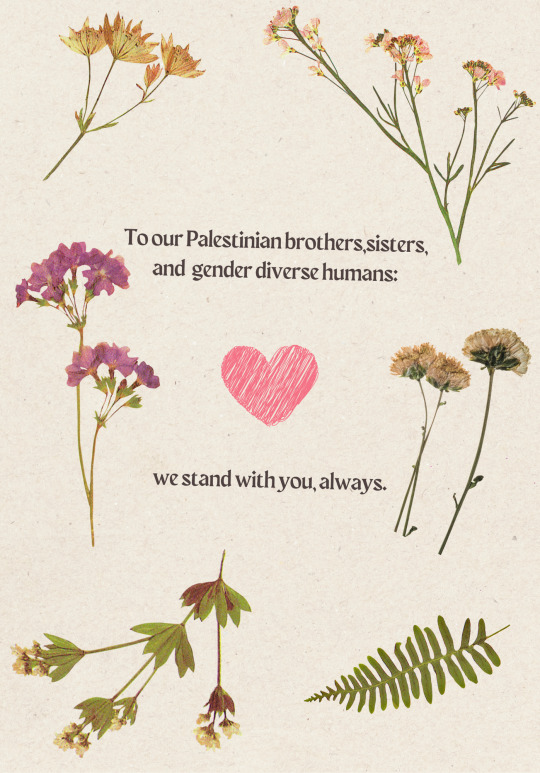
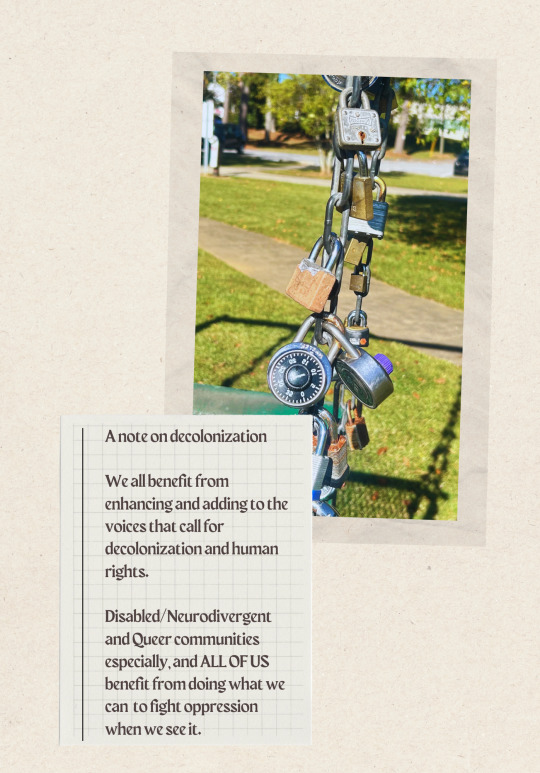

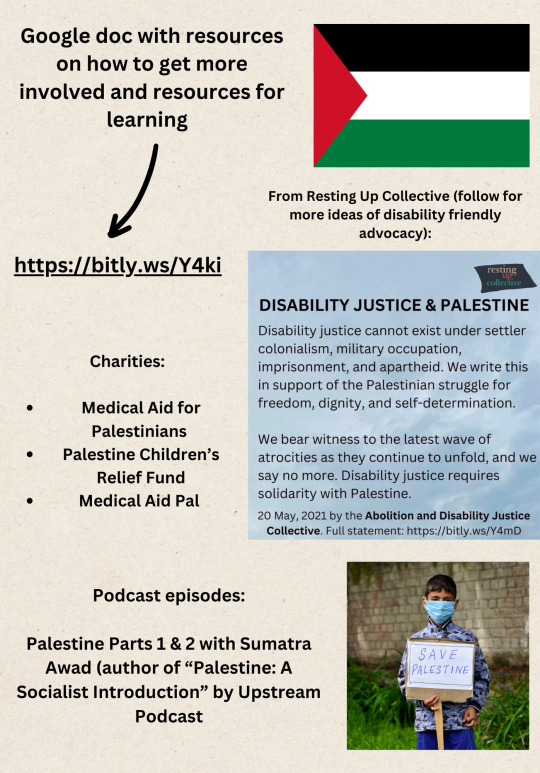
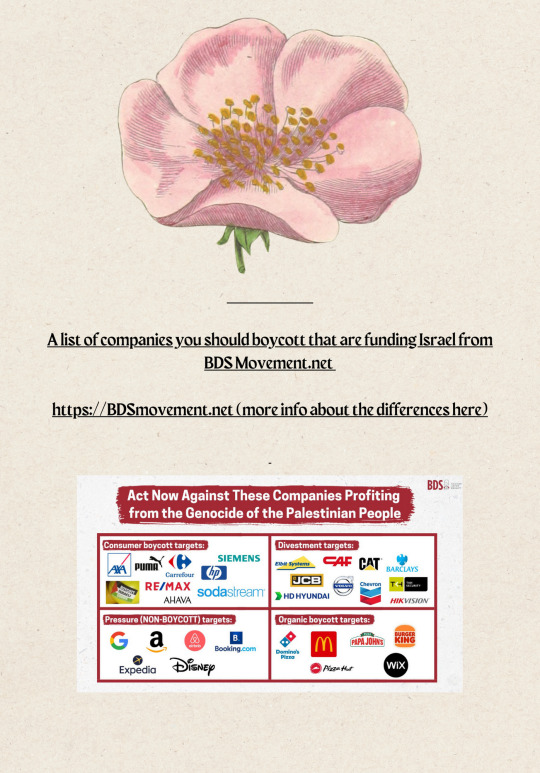
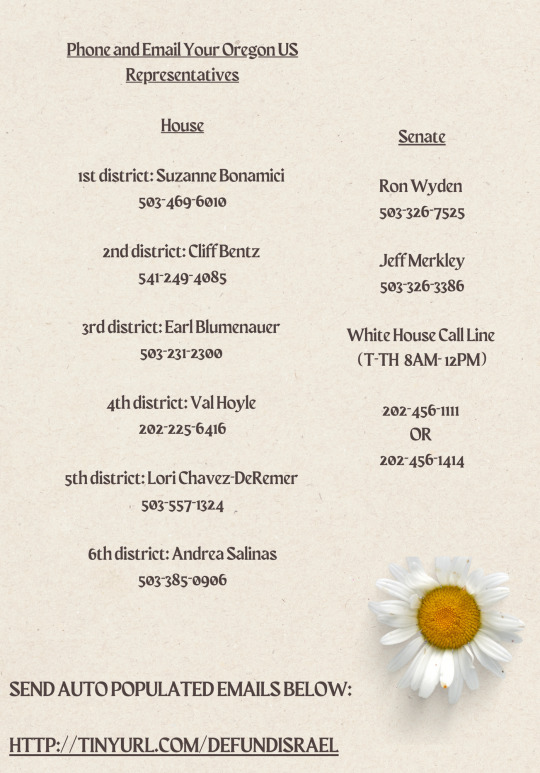
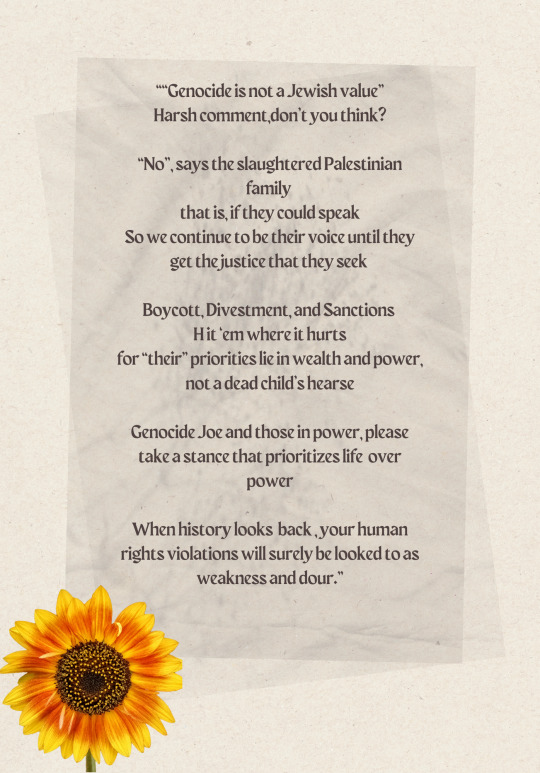
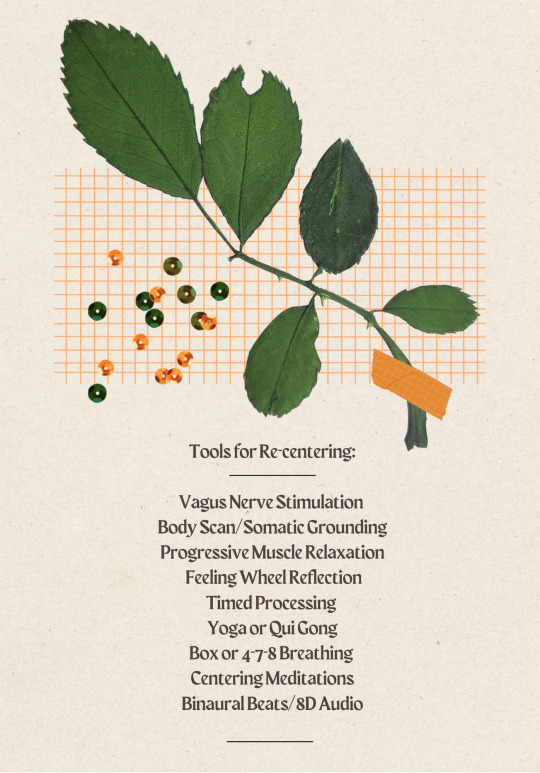
A zine written by a radical, disabled/ neurodivergent, queer of Portland Oregon, with contributions from other disabled, queer artists and advocates as possible
A note:
Thank you to Canva and their artists for creating accessible and beautiful zine templates and graphic elements! And thank you to everyone who continues to put in the effort to fight against oppression. This is for you, especially those of you in the Portland Oregon disability/neurodivergent, and queer communities. And, of course, this is in honor and memory and to rally increased support around our fellow Palestinian humans.
Please let me know if you or anyone you know falls into the communities in Oregon/Portland that this zine is published for and want to contribute! Feel free to share without credit, although I did post originally from my personal and professional accounts; it is more for social activism :) Please reach out if you have any interest in supplying art of any kind.
-Creator and editor
*Please note times for White House Call Line are in Pacific Standard Time”
Alt text:
First slide:
Picture of pink dried flower with stem with pink and green sequins on cream background, cover of “Radical Justice”: A zine written by a radical disabled/neurodivergent, queer of Portland; with contributions from other disabled, queer artists and advocates. Published
November 2023, Palestinian Aid Issue
Second slide: Text reads: “We acknowledge the First Nations people who are the custodians of the land on which this zine is published and contributed from:
Cayuse, Umatilla and Walla Walla
Stl’pulmsh (Cowlitz)
Clackamas
Confederated Tribes of Grand Ronde
Confederated Tribes of Siletz Indians
We also thank our QTBIPOC members who have taken up disability and queer justice and care work before us and the groundwork they have laid and the rights they died for that we continue today as a community.” Text on cream background with three dried yellow and white varied flowers on too and three on bottom.
Third slide: Text reads: “To our Palestinian brothers,sisters, and gender diverse humans: we stand with you, always.” With a heart in the middle of the broken up words and surrounded by 6 varied dried flowers and leaves.
Fourth slide: A note on decolonization
We all benefit from enhancing and adding to the voices that call for decolonization and human rights.
Disabled/Neurodivergent and Queer communities especially, and ALL OF US benefit from doing what we can to fight oppression when we see it. Picture above on a swing with locks on it.
Fifth slide: Graphic reads “Where there is oppression, there will be resistance.” graphic by Poonam Whabi.
Below, an advertisement for a course called “Economics for Emancipation: A course on Capitalism, Solidarity, and How we get free”
Sixth slide:
Another picture of a Palestinian, masculine presenting child holding a sign with “Save Palestine” on it.
Google doc with resources on how to get more involved and resources for learning at https://bitly.ws/Y4ki.
Charities:
Medical Aid for Palestinians
Palestine Children’s Relief Fund
Medical Aid Pal
Podcast episodes:
Palestine Parts 1 & 2 with Sumatra Awad (author of “Palestine: A Socialist Introduction” by Upstream Podcast
Seventh slide: Picture of a pink flower with yellow inner seeds, under which the text reads: “A list of companies you should boycott that are funding Israel from BDS Movement.net
https://BDSmovement.net (more info about the differences here)”
Please see list from graphic below at this site as well. Text on top of graphic reads: “Act now against these companies profiting from the Genocide of the Palestinian People “
Eighth slide: Picture of a white flower in bottom right. Text reads: “Phone and Email Your Oregon US Representatives
House
1st district: Suzanne Bonamici
503-469-6010
2nd district: Cliff Bentz
541-249-4085
3rd district: Earl Blumenauer
503-231-2300
4th district: Val Hoyle
202-225-6416
5th district: Lori Chavez-DeRemer
503-557-1324
6th district: Andrea Salinas
503-385-0906”
Text continued in the right side with, “Senate
Ron Wyden
503-326-7525
Jeff Merkley
503-326-3386
White House Call Line
(T-TH 8AM- 12PM)
202-456-1111
OR
202-456-1414”
Bottom reads, “Send auto Populated Emails Below:
http://tinyurl.com/defundisrael”
Ninth slide: Poem reads: ““Genocide is not a Jewish value”
Harsh comment,don’t you think?
“No”, says the slaughtered Palestinian family
that is, if they could speak
So we continue to be their voice until they get the justice that they seek
Boycott, Divestment, and Sanctions
H it ‘em where it hurts
for “their” priorities lie in wealth and power, not a dead child’s hearse
Genocide Joe and those in power, please take a stance that prioritizes life over power
When history looks back , your human rights violations will surely be looked to as weakness and dour.”
Picture of a sunflower in bottom left
Tenth slide: Picture of life-like leaves taped to a photo peg board with sequins.
Text reads, “Tools for Re-centering:
Vagus Nerve Stimulation
Body Scan/Somatic Grounding
Progressive Muscle Relaxation
Feeling Wheel Reflection
Timed Processing
Yoga or Qui Gong
Box or 4-7-8 Breathing
Centering Meditations
Binaural Beats/8D Audio”
22 notes
·
View notes
Text
By Julia Kane. April 27, 2023. On an overcast Saturday in March, Serina Fast Horse stands in a ring of freshly planted, 12-foot-tall willow cuttings. Soft white buds are just beginning to emerge from their gray stems.
Easing the tips of the willows toward the center of the circle, Fast Horse holds them in place while another volunteer ties them together with twine.
Fast Horse and about three dozen others have gathered at Shwakuk Wetland, five acres of land situated between a residential neighborhood and a freight warehouse in north Portland, just south of Columbia Edgewater Country Club.
In time, the trees they plant and gently shape will grow into a willow dome—a living structure people can gather around for ceremonies, educational programs or just to enjoy the space.
Shwakuk, which is pronounced “show-kayk” and means little frog in Chinook Wawa, is a unique site co-managed by the local Indigenous community and Portland’s Bureau of Environmental Services.
When the city acquired the land in 2016, it was a pumpkin patch.
Since then, the team responsible for stewarding it has worked to restore the wetland. Now it’s used to to cultivate first foods, medicines and basketry plants.
It’s also reconnecting area residents with the land.
Fast Horse, who is Lakota and Blackfeet, serves as a community liaison on the Shwakuk project, bridging the gap between the local Indigenous community and city employees.
Since getting involved with the project, the 28-year-old Portlander has also gone on to found Kimímela Consulting. Her goal is to bring the Indigenous community into environmental decision-making processes at the city and state level.
“When we’re able to come together and uplift Indigenous knowledge—and learn from each other, too, because there are things from western science and ecology that are important for restoration—we can change these systems to be more regenerative,” says Fast Horse.
“Indigenizing” not “de-colonizing”
For Fast Horse, the choice to use the word Indigenize rather than decolonize is intentional.
“When we say Indigenize, it’s centering the Indigenous perspective and being forward-thinking instead of centering colonization and that experience,” she says.
In restoration work, the Indigenous perspective hasn’t often been taken into consideration.
“Our program has always used native plants, but the selection wasn’t necessarily based on the Indigenous communities’ needs or desires,” says Toby Query, a natural resource ecologist with Portland’s Bureau of Environmental Services. “It was more about what would survive and what would fulfill our agency’s goals as far as shading the water, wildlife habitat and structure, and so forth.”
At Shawkuk, the Indigenous community put together a list of desired plants, which included first foods, medicines and plants used for traditional crafts.
That list has guided Query and the rest of the team involved in day-to-day restoration work at the site.
So far, they’ve had success at growing tule, a sedge used in basketry and canoe-making, along with yarrow, a medicinal plant, and camas, a plant with an edible, bulb-like root. They’ve also planted yampah, a wild carrot.
Instead of spraying herbicide, the restoration team uses vinyl from old billboards to block the sun and kill invasive grasses. Sometimes, they’ll braid invasive grasses around native plants, like yellow dock, horsetail and cattail, so that they stay low to the ground and do not choke out other plants.
“It takes a lot of effort to do it,” says Query, who has spent many hours braiding reed canarygrass alongside workers from Wisdom of the Elders, an Indigenous-led group. “While we were doing it we were enjoying conversation, and it was kind of a healing process.”
Query has implemented many techniques he’s learned from the Indigenous community at the 20 or so sites he stewards across the city.
“It’s really informed what I plant, and how I take care of plants,” he says.
Tending parties, wild tea
Healing is a critical element of Indigenizing restoration work.
In fact, says Fast Horse, “my deepest wish for this work is to bring folks together and to heal our relationships to each other and to the earth.”
At Shwakuk, she’s brought people together by helping organize “tending parties” that attract members of the local Indigenous community, students from Portland State University, city employees and others.
The groups learn about a site, spend a few hours helping with a restoration project and gather for lunch.
Oftentimes, Judy BlueHorse Skelton, an assistant professor at Portland State University who has helped lead the Shwakuk restoration, will make tea for everyone.
She makes the tea using a sprig of Doug fir gathered onsite, and sometimes rosehips, Oregon grape and western redcedar.
“We’re taught that to sip tea together is to become a relative, or to form a relationship,” says BlueHorse Skelton, who is Nez Perce and Cherokee. “It’s also deepening our intimate relationship with the plant world. It’s a big part of Indigenous traditional ecological and cultural knowledge, and it’s embedded in the work that we’re all doing.”
Intern to owner
Restoring Shwakuk was pivotal for Fast Horse, who first got involved with the project as an intern with Environmental Services.
“I was able to be an internal advocate to make sure what the community was saying was being upheld in a really meaningful way,” says Fast Horse. “I would be in these internal meetings, and so that perspective got woven throughout the process.”
In those meetings, the impact that she could have as a community liaison became clear.
From Query’s point of view: “To have somebody that has an Indigenous perspective, but is also willing to be part of the agency side of things, and to be able to walk between those two cultures has been really important.”
Fast Horse began giving presentations about lessons learned from Shwakuk and found that other city agencies and organizations wanted Indigenous input on their projects, too.
Portland has recently become more proactive about reaching out to the Indigenous community. The city hired its first full-time tribal relations director, Laura John, in 2017—a move BlueHorse Skelton says has been “immensely transformative.”
Two years ago, Fast Horse founded her own company, Kimímela Consulting, based in Milwaukie, Ore. She’s continued to act as a liaison between the Indigenous community and various agencies and organizations.
Most of her work has to do with land restoration, but she’s also working with Portland State University to rename a street. The campus’ Native American Student and Community Center is currently located on a street named after President Andrew Jackson, known for enforcing the genocidal Indian Removal Act of 1830.
“She’s been providing a voice and venue for the Indigenous community, including students and folks across all agencies, to get involved—including just the average community member who may not have a voice,” says BlueHorse Skelton.
A reconnected future
According to BlueHorse Skelton, the work that Fast Horse is doing to ensure the Indigenous community is part of decision-making processes is critical.
“When cities look, today, at how to heal, how to begin to restore, how to protect what’s left,” says BlueHorse Skelton, “we have to be part of it.”
She sees Fast Horse as the first of a new, emerging generation of Indigenous leaders in the region.
“As some of us become elders, who carries that work forward?” BlueHorse Skelton asks. “That’s Serina.”
“A lot of times people put us in the past, and that’s a huge misconception,” says Fast Horse. “We’ve always been adaptable people. We’re not trying to revert back to anything, we’re going into the future.
“We’re all interconnected in this physical and spiritual plane. With Indigenous knowledge, we can reconnect to that and live in a way that is more in line with natural systems that are regenerative and life-giving.”
44 notes
·
View notes
Text
By: Richard Dawkins
Published: Mar 4, 2023
I’m in New Zealand, climax to my antipodean speaking tour, where I walked headlong into a raging controversy. Jacinda Ardern’s government implemented a ludicrous policy, spawned by Chris Hipkins’s Ministry of Education before he became prime minister. Science classes are to be taught that Māori ‘Ways of Knowing’ (Mātauranga Māori) have equal standing with ‘western’ science. Not surprisingly, this adolescent virtue-signalling horrified New Zealand’s grown-up scientists and scholars. Seven of them wrote to the Listener magazine. Three who were fellows of the NZ Royal Society were threatened with an inquisitorial investigation. Two of these, including the distinguished medical scientist Garth Cooper, himself of Māori descent, resigned (the third unfortunately died). I was delighted to meet Professor Cooper for lunch, with others of the seven. His resignation letter cited the society’s failure to support science against its denigration as ‘a western European invention’. He was affronted, too, by a complaint (not endorsed by the NZRS) that ‘to insist Māori children learn to read is an act of colonisation’. Is there an implication here – condescending, if not downright racist – that ‘indigenous’ children need separate, special treatment?
Perhaps the most disagreeable aspect of this sorry affair is the climate of fear. We who don’t have a career to lose should speak out in defence of those who do. The magnificent seven are branded heretics by a nastily zealous new religion, a witch-hunt that recalls the false accusations against J.K. Rowling and Kathleen Stock. Professor Kendall Clements was removed from teaching evolution at the University of Auckland, after the School of Biological Sciences Putaiao Committee submitted the following recommendation: ‘We do not feel that either Kendall or Garth should be put in front of students as teachers. This is not safe for students…’ Not safe? Who are these cringing little wimps whose ‘safety’ requires protection against free speech? What on earth do they think a university is for?
To grasp government intentions requires a little work, because every third word of the relevant documents is in Māori. Since only 2 per cent of New Zealanders (and only 5 per cent of Māoris) speak that language, this again looks like self-righteous virtue-signalling, bending a knee to that modish version of Original Sin which is white guilt. Mātauranga Māori includes valuable tips on edible fungi, star navigation and species conservation (pity the moas were all eaten). Unfortunately it is deeply invested in vitalism. New Zealand children will be taught the true wonder of DNA, while being simultaneously confused by the doctrine that all life throbs with a vital force conferred by the Earth Mother and the Sky Father. Origin myths are haunting and poetic, but they belong elsewhere in the curriculum. The very phrase ‘western’ science buys into the ‘relativist’ notion that evolution and big bang cosmology are just the origin myth of white western men, a narrative whose hegemony over ‘indigenous’ alternatives stems from nothing better than political power. This is pernicious nonsense. Science belongs to all humanity. It is humanity’s proud best shot at discovering the truth about the real world.
My speeches in Auckland and Wellington were warmly applauded, though one woman yelled a protest. She was politely invited to participate, but she chose to walk out instead. I truthfully said that, when asked my favourite country, I invariably choose New Zealand. Citing the legacy of Ernest Rutherford, the greatest experimental physicist since Faraday, I begged my audiences to reach out to their MPs in support of New Zealand science. The true reason science is more than an origin myth is that it stands on evidence: massively documented evidence, double blind trials, peer review, quantitative predictions precisely verified in labs around the world. Science reads the billion-word DNA book of life itself. Science eradicates smallpox and polio. Science navigates to Pluto or a tiny comet. Science almost certainly saved your life. Science works.
Postscript on the flight out: Air New Zealand think it a cute idea to invoke Māori gods in their safety briefing. Imagine if British Airways announced that their planes are kept aloft by the Holy Ghost in equal partnership with Bernoulli’s Principle and Newton’s First Law. Science explains. It lightens our darkness. Science is the poetry of reality. It belongs to all humanity. Kia Ora!
[ Via: https://archive.is/ehxJ3 ]
==
When you're an authoritarian putting people through inquisitions and threatening their livelihoods, you're not doing science, you're doing ideology... and possibly theology.
And it's reliably the case that there's some gross form of virtuous (neo)racism baked in there somewhere.
#Richard Dawkins#science#Mātauranga Māori#Matauranga Maori#New Zealand#ways of knowing#indigenous ways of knowing#corruption of science#corruption of knowledge#neoracism#cultural relativism#relativism#decolonize science#decolonize stem#religion is a mental illness
22 notes
·
View notes
Text
WHERE I’M AT
PRO:
Disability-activism-informed environmentalism
Inside growing
Collective action
Gardening for the rest of us
Farmer’s markets
Small-scale agriculture
future food
hope on purpose
land back + decolonization
physical media
right to repair
mycology
green death practices
right to privacy + digital privacy
abolition (both cops and prisons)
transformative justice
an ad-free future
local community
foraging
sci-fi aesthetics and movements that allow us to imagine a better future, including solarpunk and afro-futurism
a more equitable, inclusive future
better ways of giving money and running non-profits
hearing and thinking about voices from across futurist movements
understanding how the news media cycle and current news climate and culture impact our understanding of the world
Ursula K. Le Guin, adrienne maree brown, Octavia Butler, Rebecca Solnit, Robin Wall Kimmerer
INTERESTED IN:
Space travel, both private and state-sponsored, with an optimistic but critical eye
all sorts of sci-fi and sci-fi aesthetics
the impact of nature on the human brain, and humans’ connection to nature
fixing effective alturism
nature and STEM education
alternative and hypothetical political models
expanding my understanding of environmentalism from a disability-justice-informed perspective
WARY OF:
greenwashing
perfectionism, “one size fits all”, and uncompassionate views on personal environmental responsibility
eco-facism
non-intersectional eco-activism
BOOKS AND RESOURCES:
News + Publications:
Future Crunch (bi-weekly optimistic newsletter)
YES! magazine (”solutions journalism”)
Science, Food, Nature, Foraging
Best American Science and Nature Writing from the past few years
Forager’s Harvest by Samuel Thayer
Entangled Life by Merlin Sheldrake (mushrooms!)
How to Keep House While Drowning by KC Davis (among other things, covers how to balance environmental ideals with accessibility needs)
Nonviolent Communication by Marshall Rosenberg
Trauma Stewardship: An Everyday Guide to Caring for Self While Caring for Others by Laura van Dernoot Lipsky (explicitly covers environmental grief)
Peacebuilding + Transformational Justice + Surviving in this century
Emergent Strategy by adrienne maree brown
Range: Why Generalists Triumph in a Specialized World by David Epstein
Racism and Decolonization
Decolonization Is Not A Metaphor
White Fragility by Robin Diangelo
An Indigenous Peoples’ History of the United States by Roseanne Dunbar Ortiz
ON MY TO-READ LIST:
Pleasure Activism by adrienne maree brown
more Butler and Le Guin
All We Can Save by Ayana Elizabeth Johnson
20 notes
·
View notes
Note
I hope the community you gather in your OFMD anti-racism group are genuine in a desire to listen. I am an Anishinaabe, two-spirit OFMD fan who works in Reconciliation. I'm also an Izzy fan. And I have encountered nothing as unwelcoming, dismissive, or patronizing in this fandom - or disrespectful to real decolonizing efforts - as seeing people dress up shipwar or character preferences as meaningful anti-racist work. It's an insult and a waste of what could be real contributions to real people.
i find this ask to be incredibly contradictory. you claim decolonizing efforts but you're a izzy fan? how does that work? how are you a fan of the villain who is the face of colonization but then turn around and say the anti-racism efforts being made in this fandom is disguised as "ship wars and character preferences"?
correct me if i'm wrong, but what i'm hearing here is: people have been unwelcome and dismissive of me as a izzy fan of color. that... makes zero sense. all criticisms of izzy is taking stuff he's done canonically and spelling them out because things like izzy's homophobia and racism does unfortunately go over people's heads. none of that would be dismissive or disrespectful unless you disagree?
people hate izzy and prefer other characters (which i'm assuming you're talking about other white characters like Stede and Lucius) because they're... not racist and isn’t the villain? at least in Stede's case, he's trying to to be better. he definitely has his own biases and does fall into racist mindsets but he's not doing them on purpose. also he’s one of the main protagonists so like, him having a lot of fans isn’t remotely weird
are you implying that being against a ship that ships a man of color with his racist abuser is... a ship war type of situation? because the basis of being against ed/izzy stems from anti-racism so. uh. i'm gonna need you to elaborate
5 notes
·
View notes
Text
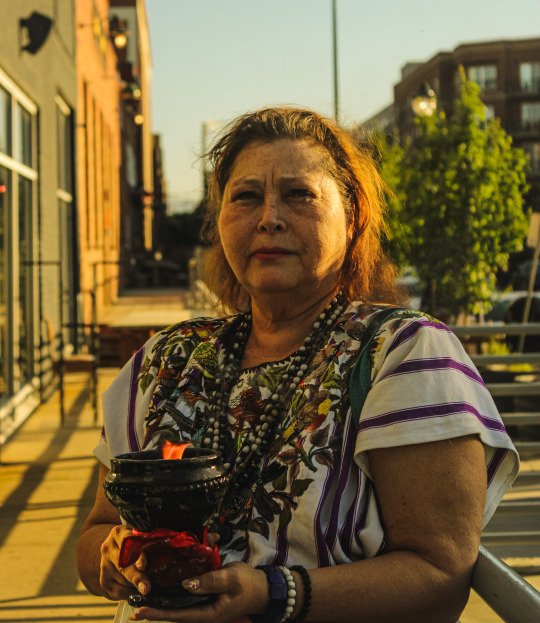
Not a classmate. This is from last week's cacao ceremony where indigenous leader Mavis Gutierrez blessed an event in Colorado--decolonizing the Thanksgiving holiday from root to stem.
0 notes
Text
Openness in Education as a Praxis: From Individual Testimonials to Collective Voices - Open Praxis
Why is Openness in Education important, and why is it critically needed at this moment? As manifested in our guiding question, the significance of Openness in Education and its immediate necessity form the heart of this collaborative editorial piece. This rather straightforward, yet nuanced query has sparked this collective endeavour by using individual testimonies, which may also be taken as living narratives, to reveal the value of Openness in Education as a praxis. Such testimonies serve as rich, personal narratives, critical introspections, and experience-based accounts that function as sources of data. The data gleaned from these narratives points to the understanding of Openness in Education as a complex, multilayered concept intricately woven into an array of values. These range from aspects such as sharing, access, flexibility, affordability, enlightenment, barrier-removal, empowerment, care, individual agency, trust, innovation, sustainability, collaboration, co-creation, social justice, equity, transparency, inclusivity, decolonization, democratisation, participation, liberty, and respect for diversity. This editorial, as a product of collective endeavour, invites its readers to independently engage with individual narratives, fostering the creation of unique interpretations. This call stems from the distinctive character of each narrative as they voice individual researchers’ perspectives from around the globe, articulating their insights within their unique situational contexts.
0 notes